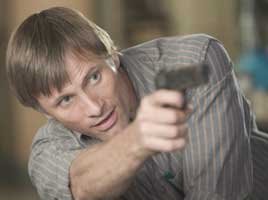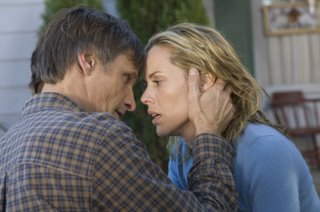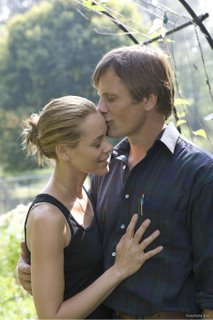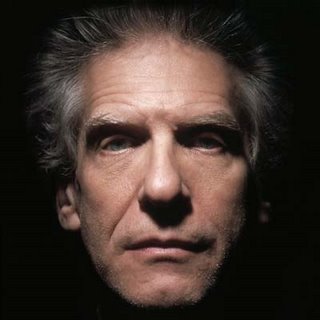two films I gotta post on, part 1: A History of Violence
 Upon returning this film to netflix, I realized that I just had to honor it with a post. It just provoked in me so much horrific, morbid wonder... What is there really, beneath the surface of this thing? And how by god was it put it there? The film is profoundly disturbing on many levels, and for that, I give it major props.
Upon returning this film to netflix, I realized that I just had to honor it with a post. It just provoked in me so much horrific, morbid wonder... What is there really, beneath the surface of this thing? And how by god was it put it there? The film is profoundly disturbing on many levels, and for that, I give it major props. After not only viewing it, but also going through the commentary and behind-the-scenes footage and hearing from Cronenberg and others about it, I have a deep respect for it, and for everyone involved. Well, except maybe for Josh Olson (I still am not over how the ones who got the most recognition for this film were Josh Olson and William Hurt... that's just... wrong... it's like Catherine Hardwicke and Nikki Reed being louded for Thirteen, rather than Holly Hunter and Evan Rachel Wood). I don't think the script had much at all to do with the success of this film... it could've gone any which way. And though it's hard to pinpoint exactly what Cronenberg did with it that saved it from its own cheap thriller trappings, it's clear that he did something big. Everything, from the totally authentic performances, to the perfect music, to that lingering sense of confusion and uncertainty on display, indicates a powerful directorial hand at work.
After not only viewing it, but also going through the commentary and behind-the-scenes footage and hearing from Cronenberg and others about it, I have a deep respect for it, and for everyone involved. Well, except maybe for Josh Olson (I still am not over how the ones who got the most recognition for this film were Josh Olson and William Hurt... that's just... wrong... it's like Catherine Hardwicke and Nikki Reed being louded for Thirteen, rather than Holly Hunter and Evan Rachel Wood). I don't think the script had much at all to do with the success of this film... it could've gone any which way. And though it's hard to pinpoint exactly what Cronenberg did with it that saved it from its own cheap thriller trappings, it's clear that he did something big. Everything, from the totally authentic performances, to the perfect music, to that lingering sense of confusion and uncertainty on display, indicates a powerful directorial hand at work.  A few things I learned are quite telling. For instance, it is revealed on the DVD that two of Maria Bello's best moments in the film did not even exist in the script; they were inserted totally by Bello and Cronenberg, and without them, Edie Stall would've just been another standard supporting wife. Thank god they fixed that. Perhaps I just feel the need to rant at the writer, Josh Olson, since this film proved wrong a (semi)famous Julianne Moore quote to the effect of "the screenplay isn't just a blueprint; it's all you have." WRONG, Julianne. Work with Cronenberg. He will prove you wrong (and also might help save your flailing career if you let him, so get on it!)... not to demean screenwriters, but what magic a great director can make... it doesn't have to be there in the writing.
A few things I learned are quite telling. For instance, it is revealed on the DVD that two of Maria Bello's best moments in the film did not even exist in the script; they were inserted totally by Bello and Cronenberg, and without them, Edie Stall would've just been another standard supporting wife. Thank god they fixed that. Perhaps I just feel the need to rant at the writer, Josh Olson, since this film proved wrong a (semi)famous Julianne Moore quote to the effect of "the screenplay isn't just a blueprint; it's all you have." WRONG, Julianne. Work with Cronenberg. He will prove you wrong (and also might help save your flailing career if you let him, so get on it!)... not to demean screenwriters, but what magic a great director can make... it doesn't have to be there in the writing. And while on the topic of Julianne Moore, I think it's not unreasonable to compare Violence to Moore's own film Far From Heaven; both are highly stylized pieces about "perfect Americana" that might have been farsical if not for total commitment from great actors. Both gradually begin to explore the darkness that lurks beneath the surface of our placid societal exterior, and neither give easy answers as to how to reconcile the depth with the surface. Yet somehow the ending of Violence becomes far more disturbing; while Heaven leaves us awash in a kind of beautiful sadness, Violence leaves us with something else, something much harder (at least for me) to pin down. Like Heaven, it seems to ask, "now that we know our true nature, what is there left to do?" and leaves no answers. I suppose most great films leave its viewers with such a question, but the particular way Violence asked it left me trembling... perhaps in fear, perhaps in sadness, but mostly in that special rapture one feels when one is faced with a great work of art. Bravo, Cronenberg.
And while on the topic of Julianne Moore, I think it's not unreasonable to compare Violence to Moore's own film Far From Heaven; both are highly stylized pieces about "perfect Americana" that might have been farsical if not for total commitment from great actors. Both gradually begin to explore the darkness that lurks beneath the surface of our placid societal exterior, and neither give easy answers as to how to reconcile the depth with the surface. Yet somehow the ending of Violence becomes far more disturbing; while Heaven leaves us awash in a kind of beautiful sadness, Violence leaves us with something else, something much harder (at least for me) to pin down. Like Heaven, it seems to ask, "now that we know our true nature, what is there left to do?" and leaves no answers. I suppose most great films leave its viewers with such a question, but the particular way Violence asked it left me trembling... perhaps in fear, perhaps in sadness, but mostly in that special rapture one feels when one is faced with a great work of art. Bravo, Cronenberg.Favorite moments:
 Tom Stall gazing at his son after a killing... Viggo is so scary, yet civilized... a perfect symbol for the layered feelings here.
Tom Stall gazing at his son after a killing... Viggo is so scary, yet civilized... a perfect symbol for the layered feelings here.Tom and Edie's second sex scene... "fuck YOU, Joey!".
Edie standing up to Fogerty... you GO girl.
The ending... a picture says a thousand words... and a good motion picture says a million.


0 Comments:
Post a Comment
<< Home